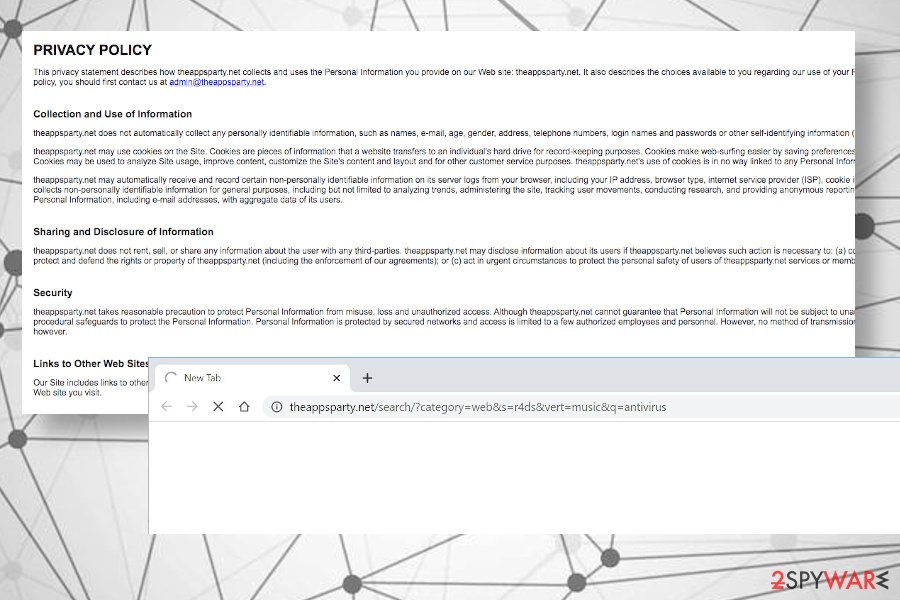Theappsparty.net (Removal Guide) - Chrome, Firefox, IE, Edge
Theappsparty.net Removal Guide
What is Theappsparty.net?
Theappsparty.net is a rogue search engine that rendered sponsored Yahoo search to promote affiliate websites

Theappsparty.net is a potentially unwanted application (PUA)[1] that is infamous for aggressive modifications of the web browser's settings. It is also dubbed as a browser hijacker as it can change the start page, search provider, and a new tab window without asking for the user's permission. Usually, it is distributed in one pack with freeware and, since the user is not directly warned about the bundle, the theappsparty.net extension gets installed by default.
Although referring to this site as theappsparty.net virus is not appropriate, the potential risks that it poses should not be underestimated. The search may be involved in affiliate marketing, meaning that its main goal is to redirect people to the domains of its sponsors and generate pay-per-click revenue[2] from advertising.
In short, people who get tricked by this PUA start experiencing unpleasant activities within the web browser. An attempt to open any preferred website end up with theappsparty.net redirects to Yahoo search or other unwanted domains. Random sites exhibit many ads, pop-ups, banners, and in-text links that once clicked reroute you to potentially dangerous websites, rogue online surveys, and other potentially dangerous content.
| Name | Theappsparty.net |
| Category | Browser hijacker / Potentially Unwanted Application (PUA) |
| Distribution | The malware spreads bundled with freeware and shareware via third-party download websites |
| Targeted OS | Windows and Mac OS |
| Symptoms | Altered start page, search engine, new tab window, toolbars. Besides, it may be the culprit of an excessive amount of ads, and regular redirects to theappsparty.net related websites |
| Risks | The search site is not dangerous as such. However, the content that it is programmed to deliver may be potentially dangerous, i.e. promote malware, display rogue prize giveaways, or reroute to phishing sites |
| Affected web browsers | This search site can settle on any web browser, including but not limited to Google Chrome, Mozilla Firefox, Internet Explorer, Safari, Microsoft Edge, etc. |
| Removal options | You can select to eliminate this browser hijacker with the help of a professional AV program or follow the step-by-step tutorial submitted by our technicians. You can find the instructions down below this post |
| Optimization | The optimization process is an imminent procedure after a malware attack. Programs like adware or hijacker tend to affect system files and registries leading to intrusive error messages. To prevent that, use a tool like FortectIntego |
Advertising marketing is vast. Third-parties get affiliated with an intention to promote their products and services and sometimes don't mind the techniques used for advertising. Therefore, if you got stuck with Theappsparty.net redirects, contacting the people behind the admin@theappsparty.net is a waste because all they seek is to receive their revenue.
Besides, the developers of the theappsparty.net virus hurry to prevent themselves from being accused of potentially dangerous activities and include suchlike statements on their End User License Agreement:[3]
Links to Other Web Sites
Our Site includes links to other Web sites whose privacy practices may differ from those of theappsparty.net. If you submit Personal Information to any of those sites, your information is governed by their privacy statements. We encourage you to carefully read the privacy statement of any Web site you visit.
In other words, they reject responsibility that people are forced to visit by theappsparty.net redirects. They do not check or monitor the content that their sponsors seek to promote, so no one can guarantee that landing on the suspicious third-party website you won't be tricked into downloading malware or a malicious ransomware virus.
Apart from redirects, theappsparty.net hijack poses difficulties in terms of removal. In order to help itself in keeping persistent, the malware initiates the following alterations on settings:
- replaces start page to theappsparty.net (simple search with an appealing background image)
- alter homepage and new tab window
- installs extensions
- inserts tracking cookies to collect search queries, IP address, geolocation, and similar information
- sets web browser to display commercial content on random websites
- commands the search to redirect to the sponsored https://search.yahoo.com/ search site
- installs related keys in Windows registries
- can be downloaded with other malware programs
- diminish PC's performance
- causes the web browser's freezes, etc.
Therefore, even though programs like theappsparty.net virus cannot steal user's credentials, encrypt files, take screenshots, remotely connect to C2 servers or perform other highly dangerous tasks, they pose a potential danger of redirects to malicious domains where you can get a really malicious cyber infection. Besides, browser hijackers are intrusive due to advertising campaigns and can cause an extremely negative browsing experience.

Theappsparty.net removal is the thing that you should start thinking as soon as your web browser gets hijacked. Do not postpone the elimination of programs that stealthily infiltrate your PC because they may initiate potentially dangerous activities behind your bank. Besides, scan the system with a professional optimization tool, such as FortectIntego once PUA is removed to recover the system to the previous state.
Shady websites are not recommended visiting due to possible malware installers
PUPs, namely adware and browser hijacker, are seldom installed by users' choice. Usually, they get installed without being noticed via software bundles, deceptive third-party websites, or freeware installers with pre-selected malware entries. Third-party download websites contain many popular freeware programs that have add-ons or extensions as pre-selected attachments, so people download freeware consciously without realizing that it has additional features.
However, third-party download sources are not the only place to get malware. Often well-known applications distributed on reputable sources, including official websites can have unwanted applications aside or misleading ads may trick into downloading unwanted tools without realizing that. No matter how a PUPs manage to get installed, it is important for you to know what precautionary measures you can take to avoid suchlike infiltration. Experts from losvirus.es[4] claim that these measures would help to avoid PUPs in many cases:
- Try to stick to the most reputable freeware download sources;
- Read the comment section of the app that you have selected for download and make research on it online;
- Select the Advanced or Custom option during any installation. Keep in mind that Express or Quick option automatically gives permission for additional apps to get installed without notifying you in an explicit way;
- De-select all extensions, add-ons, toolbars, and whatnot appended to freeware because such tools are usually used for advertising and marketing purposes.

Get rid of Theappsparty.net virus from the system to prevent damage
Since browser hijackers alter various settings both on the web browser and the system itself, you have to remove Theappsparty.net as soon as possible, to prevent any damage that it may trigger. Continuous redirects to questionable websites, tricky ads on random websites, and data harvesting cookies are just a few examples of the symptoms when having a browser hijacked.
Those who do not think of Theappsparty.net removal may start noticing additional symptoms when browsing the internet, for example, the type of ads displayed may get more aggressive (various rogue online surveys, phishing websites, x-rated domains, etc.). Consequently, you may get tricked into installing additional malware on the system, thus affecting PC's performance, web browsing experience, and expose your PC in real danger.
It is possible to remove Theappsparty.net virus with a tool like Malwarebytes or SpyHunter 5Combo Cleaner. Both programs are powerful to deal with malicious cyber infections, so malware elimination is not a big deal. Automatic malware elimination is recommended to make sure that all potentially dangerous programs have successfully been removed.
Nevertheless, you can also opt for manual Theappsparty.net removal. The guide submitted below can help you. The first thing you should do is to remove the malware. After that, restore your web browser's settings by disabling extensions or resetting the default settings. Finally, optimize the system with FortectIntego to fix any damage that malware initiated to the system directly.
You may remove virus damage with a help of FortectIntego. SpyHunter 5Combo Cleaner and Malwarebytes are recommended to detect potentially unwanted programs and viruses with all their files and registry entries that are related to them.
Getting rid of Theappsparty.net. Follow these steps
Uninstall from Windows
Sometimes browser hijackers have browser helper objects that interfere with security tools and block their scanners. In this case, you may need to restart Windows into Safe Mode with Networking to remove Theappsparty.net successfully.
Instructions for Windows 10/8 machines:
- Enter Control Panel into Windows search box and hit Enter or click on the search result.
- Under Programs, select Uninstall a program.

- From the list, find the entry of the suspicious program.
- Right-click on the application and select Uninstall.
- If User Account Control shows up, click Yes.
- Wait till uninstallation process is complete and click OK.

If you are Windows 7/XP user, proceed with the following instructions:
- Click on Windows Start > Control Panel located on the right pane (if you are Windows XP user, click on Add/Remove Programs).
- In Control Panel, select Programs > Uninstall a program.

- Pick the unwanted application by clicking on it once.
- At the top, click Uninstall/Change.
- In the confirmation prompt, pick Yes.
- Click OK once the removal process is finished.
Delete from macOS
System Restore is an alternative solution to get your system back to the previous state.
Remove items from Applications folder:
- From the menu bar, select Go > Applications.
- In the Applications folder, look for all related entries.
- Click on the app and drag it to Trash (or right-click and pick Move to Trash)

To fully remove an unwanted app, you need to access Application Support, LaunchAgents, and LaunchDaemons folders and delete relevant files:
- Select Go > Go to Folder.
- Enter /Library/Application Support and click Go or press Enter.
- In the Application Support folder, look for any dubious entries and then delete them.
- Now enter /Library/LaunchAgents and /Library/LaunchDaemons folders the same way and terminate all the related .plist files.

Remove from Microsoft Edge
Delete unwanted extensions from MS Edge:
- Select Menu (three horizontal dots at the top-right of the browser window) and pick Extensions.
- From the list, pick the extension and click on the Gear icon.
- Click on Uninstall at the bottom.

Clear cookies and other browser data:
- Click on the Menu (three horizontal dots at the top-right of the browser window) and select Privacy & security.
- Under Clear browsing data, pick Choose what to clear.
- Select everything (apart from passwords, although you might want to include Media licenses as well, if applicable) and click on Clear.

Restore new tab and homepage settings:
- Click the menu icon and choose Settings.
- Then find On startup section.
- Click Disable if you found any suspicious domain.
Reset MS Edge if the above steps did not work:
- Press on Ctrl + Shift + Esc to open Task Manager.
- Click on More details arrow at the bottom of the window.
- Select Details tab.
- Now scroll down and locate every entry with Microsoft Edge name in it. Right-click on each of them and select End Task to stop MS Edge from running.

If this solution failed to help you, you need to use an advanced Edge reset method. Note that you need to backup your data before proceeding.
- Find the following folder on your computer: C:\\Users\\%username%\\AppData\\Local\\Packages\\Microsoft.MicrosoftEdge_8wekyb3d8bbwe.
- Press Ctrl + A on your keyboard to select all folders.
- Right-click on them and pick Delete

- Now right-click on the Start button and pick Windows PowerShell (Admin).
- When the new window opens, copy and paste the following command, and then press Enter:
Get-AppXPackage -AllUsers -Name Microsoft.MicrosoftEdge | Foreach {Add-AppxPackage -DisableDevelopmentMode -Register “$($_.InstallLocation)\\AppXManifest.xml” -Verbose

Instructions for Chromium-based Edge
Delete extensions from MS Edge (Chromium):
- Open Edge and click select Settings > Extensions.
- Delete unwanted extensions by clicking Remove.

Clear cache and site data:
- Click on Menu and go to Settings.
- Select Privacy, search and services.
- Under Clear browsing data, pick Choose what to clear.
- Under Time range, pick All time.
- Select Clear now.

Reset Chromium-based MS Edge:
- Click on Menu and select Settings.
- On the left side, pick Reset settings.
- Select Restore settings to their default values.
- Confirm with Reset.

Remove from Mozilla Firefox (FF)
Remove dangerous extensions:
- Open Mozilla Firefox browser and click on the Menu (three horizontal lines at the top-right of the window).
- Select Add-ons.
- In here, select unwanted plugin and click Remove.

Reset the homepage:
- Click three horizontal lines at the top right corner to open the menu.
- Choose Options.
- Under Home options, enter your preferred site that will open every time you newly open the Mozilla Firefox.
Clear cookies and site data:
- Click Menu and pick Settings.
- Go to Privacy & Security section.
- Scroll down to locate Cookies and Site Data.
- Click on Clear Data…
- Select Cookies and Site Data, as well as Cached Web Content and press Clear.

Reset Mozilla Firefox
If clearing the browser as explained above did not help, reset Mozilla Firefox:
- Open Mozilla Firefox browser and click the Menu.
- Go to Help and then choose Troubleshooting Information.

- Under Give Firefox a tune up section, click on Refresh Firefox…
- Once the pop-up shows up, confirm the action by pressing on Refresh Firefox.

Remove from Google Chrome
Theappsparty.net virus most frequently affects Google Chrome browsers. To root it out, eliminate malware and then reset web browser's settings as explained below.
Delete malicious extensions from Google Chrome:
- Open Google Chrome, click on the Menu (three vertical dots at the top-right corner) and select More tools > Extensions.
- In the newly opened window, you will see all the installed extensions. Uninstall all the suspicious plugins that might be related to the unwanted program by clicking Remove.

Clear cache and web data from Chrome:
- Click on Menu and pick Settings.
- Under Privacy and security, select Clear browsing data.
- Select Browsing history, Cookies and other site data, as well as Cached images and files.
- Click Clear data.

Change your homepage:
- Click menu and choose Settings.
- Look for a suspicious site in the On startup section.
- Click on Open a specific or set of pages and click on three dots to find the Remove option.
Reset Google Chrome:
If the previous methods did not help you, reset Google Chrome to eliminate all the unwanted components:
- Click on Menu and select Settings.
- In the Settings, scroll down and click Advanced.
- Scroll down and locate Reset and clean up section.
- Now click Restore settings to their original defaults.
- Confirm with Reset settings.

Delete from Safari
Remove unwanted extensions from Safari:
- Click Safari > Preferences…
- In the new window, pick Extensions.
- Select the unwanted extension and select Uninstall.

Clear cookies and other website data from Safari:
- Click Safari > Clear History…
- From the drop-down menu under Clear, pick all history.
- Confirm with Clear History.

Reset Safari if the above-mentioned steps did not help you:
- Click Safari > Preferences…
- Go to Advanced tab.
- Tick the Show Develop menu in menu bar.
- From the menu bar, click Develop, and then select Empty Caches.

After uninstalling this potentially unwanted program (PUP) and fixing each of your web browsers, we recommend you to scan your PC system with a reputable anti-spyware. This will help you to get rid of Theappsparty.net registry traces and will also identify related parasites or possible malware infections on your computer. For that you can use our top-rated malware remover: FortectIntego, SpyHunter 5Combo Cleaner or Malwarebytes.
How to prevent from getting browser hijacker
Choose a proper web browser and improve your safety with a VPN tool
Online spying has got momentum in recent years and people are getting more and more interested in how to protect their privacy online. One of the basic means to add a layer of security – choose the most private and secure web browser. Although web browsers can't grant full privacy protection and security, some of them are much better at sandboxing, HTTPS upgrading, active content blocking, tracking blocking, phishing protection, and similar privacy-oriented features. However, if you want true anonymity, we suggest you employ a powerful Private Internet Access VPN – it can encrypt all the traffic that comes and goes out of your computer, preventing tracking completely.
Lost your files? Use data recovery software
While some files located on any computer are replaceable or useless, others can be extremely valuable. Family photos, work documents, school projects – these are types of files that we don't want to lose. Unfortunately, there are many ways how unexpected data loss can occur: power cuts, Blue Screen of Death errors, hardware failures, crypto-malware attack, or even accidental deletion.
To ensure that all the files remain intact, you should prepare regular data backups. You can choose cloud-based or physical copies you could restore from later in case of a disaster. If your backups were lost as well or you never bothered to prepare any, Data Recovery Pro can be your only hope to retrieve your invaluable files.
- ^ Potentially Unwanted Application. Trend Micro. Cybersecurity experts.
- ^ Monetization for Beginners | Google Adsense Bid Types and Tips. Setupad. Advertising experts.
- ^ theappsparty.com Privacy Policy. The Apps Party. Privacy Policy.
- ^ NOTICIAS SOBRE SEGURIDAD Y VIRUS. LosVirus. Daily virus and spyware news.























